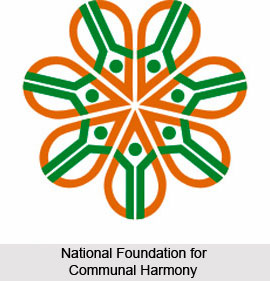 National Foundation for Communal Harmony (NFCH) was set up as an autonomous organisation with the main objective of providing assistance for the physical and psychological rehabilitation of the child victims of communal, caste, ethnic or terrorist violence. It pays special attention to their care, education and training besides promoting communal harmony, fraternity and national integration. The Home Minister is the ex-officio chairman of the Governing Council of the Foundation. The Governing Council decides broad policies, suggests measures for achieving its objectives and exercises overall supervision over the Foundation. The ex-officio chairman of the Executive Council of the Foundation is the Secretary, Ministry of Home Affairs. The management and administration of the Foundation rests with the Executive Council. The Secretary of the Foundation is its principal executive officer.
National Foundation for Communal Harmony (NFCH) was set up as an autonomous organisation with the main objective of providing assistance for the physical and psychological rehabilitation of the child victims of communal, caste, ethnic or terrorist violence. It pays special attention to their care, education and training besides promoting communal harmony, fraternity and national integration. The Home Minister is the ex-officio chairman of the Governing Council of the Foundation. The Governing Council decides broad policies, suggests measures for achieving its objectives and exercises overall supervision over the Foundation. The ex-officio chairman of the Executive Council of the Foundation is the Secretary, Ministry of Home Affairs. The management and administration of the Foundation rests with the Executive Council. The Secretary of the Foundation is its principal executive officer.
Objectives of National Foundation for Communal Harmony
The objectives of the Foundation are:
To provide financial assistance to the child victims of societal violence for their care, education & training, aimed at their effective rehabilitation;
To promote communal harmony and national integration by organizing variety of activities either independently or in association with NGOs & other organizations;
To conduct studies and grant scholarships, fellowships, etc. to institutions/ scholars for conducting studies;
To confer awards for outstanding contribution to communal harmony and national integration;
To involve central/state governments/ UT Administrations, industrial/ commercial organizations, NGOs and others in promoting the objectives of the Foundation;
To provide information services, publish journals or books, etc. on the subject.
Functions of the National Foundation for Communal Harmony
The foundation performs its various functions in keeping with its varied objectives. It has to issue appeals and applications for money and funds in furtherance of the said objects and to accept gifts, donations and subscriptions of cash and securities and of any property, either movable or immovable; to acquire, purchase or either own or take on lease or hire in the Union Territory of Delhi or out-side, temporarily or permanently, any movable or immovable property necessary or convenient for the furtherance of the objects of the Foundation; to sell, mortgage, lease, exchange and otherwise transfer or dispose of all or any property, movable or immovable, of the Foundation for the furtherance of the objects of the Foundation; to undertake and accept the management of any endowment or trust fund or donation; to undertake all such other incidental acts, deeds and things connected with, and/or germane to, the objects of the Foundation.




















